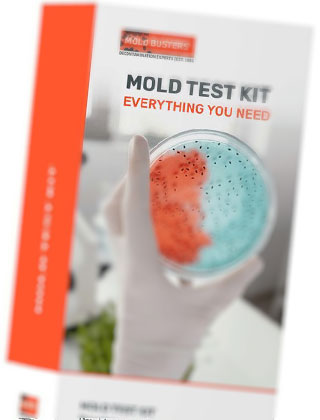MENU


When mold makes its way into a home, it doesn't just affect aesthetics; it can compromise air quality and pose serious health risks. With growing concerns about indoor mold exposure, many homeowners are turning to DIY mold test kits for a quick and cost-effective solution. But can these at-home tests truly provide the clarity needed to tackle mold problems effectively? Let's dive into the details and separate fact from fiction.
DIY mold test kits are widely available and come in different formats, each designed to detect mold in a specific way. Some kits rely on air sampling to capture airborne mold spores, using petri dishes or cassettes that collect particles from the surrounding air. This method can help identify airborne mold issues, but it may not pinpoint the exact source of contamination.
Surface sampling kits allow users to swab areas with visible mold growth or suspected problem spots, such as bathroom walls or under sinks. These kits provide a more direct analysis but require careful sampling to avoid contamination.
Bulk sampling kits take things a step further by requiring a physical sample of materials like drywall, carpet, or insulation for analysis. They can provide detailed insights into mold penetration within materials, making them useful for cases where hidden mold is suspected.
Each method serves a unique purpose, but choosing the right one depends on the suspected source and the extent of mold contamination.
Using these kits involves following a series of instructions, which typically include collecting samples from problem areas and mailing them to a laboratory for analysis. The process may seem straightforward, but it requires careful attention to detail. Improper handling of test materials, contamination during sample collection, or even external environmental factors can lead to skewed results.
A damp basement or an area with high humidity might naturally contain more mold spores, potentially resulting in an alarmingly high reading that doesn't necessarily indicate a severe problem. On the other hand, a recently cleaned space could show lower-than-actual levels, masking underlying mold issues.
Additionally, most DIY kits provide limited guidance on interpreting the results, leaving homeowners to make assumptions based on the lab report, which can sometimes be confusing and lack context. Understanding what the results mean and whether further action is required often necessitates additional research or professional consultation.
Accuracy is often the biggest concern with DIY mold test kits. Factors such as the quality of the kit, how samples are collected, and the environmental conditions during testing can all influence the results. False positives are common, as mold spores exist naturally in the air, even in clean environments. False negatives can occur if the mold is hidden behind walls or in less obvious areas that the kit cannot detect.
Professional mold inspectors utilize advanced tools and techniques that go beyond what DIY kits can offer. Air quality monitors, thermal imaging, and moisture detection devices help professionals identify mold growth that isn't visible to the naked eye. Professional assessments provide comprehensive insights into the extent and source of mold, offering actionable solutions tailored to each unique situation.
For many, the appeal of at-home mold test kits lies in their affordability and ease of use. Without the need to schedule an appointment or pay for an expensive inspection, homeowners can take matters into their own hands. These tools can serve as a convenient first step in addressing potential mold concerns, offering a quick way to determine whether further investigation is needed.
While these kits offer convenience, they fall short in several key areas. They lack the ability to identify specific mold species, meaning homeowners won't know whether they're dealing with harmless surface mold or a more dangerous strain like black mold.
Additionally, they don't provide insights into the root cause of mold growth, such as moisture intrusion or ventilation problems. Addressing mold without understanding these factors can lead to recurring issues and costly repairs down the line.
Not all mold problems can be handled with a DIY approach. Persistent moisture issues, extensive mold growth, or unexplained health symptoms such as respiratory issues or allergies often require professional assessment. If mold keeps returning despite repeated cleaning efforts, it's a sign that the underlying cause hasn't been addressed.
Delaying professional intervention can allow mold to spread further, potentially causing structural damage and increasing health risks. Mold spores can infiltrate HVAC systems, spreading throughout a home and making remediation more complex and costly. In such cases, DIY methods serve little purpose beyond initial detection.
Professional mold testing involves thorough assessments that go beyond surface-level detection. Experts examine areas prone to hidden mold growth, such as crawl spaces, behind walls, and within insulation, using specialized techniques to uncover mold colonies that the DIY approach may miss. Our professionals employ high-precision instruments, such as thermal imaging cameras, to detect temperature variations that indicate moisture accumulation - one of the primary causes of mold growth.
Hygrometers and moisture meters allow for accurate readings of humidity levels in different parts of the property, helping to pinpoint areas at risk for future mold development. Furthermore, professionals take air and surface samples from multiple locations to provide a comprehensive understanding of mold presence, its type, and concentration levels.
Our detailed assessments not only confirm mold growth but also provide actionable insights into underlying causes, such as plumbing leaks or inadequate ventilation, ensuring long-term mold prevention strategies that go beyond a simple cleanup.
Ultimately, mold testing isn't just about identifying the presence of mold - it's about protecting your home and health. Taking shortcuts might seem convenient, but when it comes to mold, precision matters. Don't let a DIY test kit trick you into a false sense of security. If you're serious about addressing mold concerns, professional testing is the way to go.
If you're dealing with persistent mold problems or just want peace of mind, reach out to O2 Mold Testing. Our team is ready to provide thorough inspections and reliable solutions tailored to your needs. Don't wait - protect your home and health today.